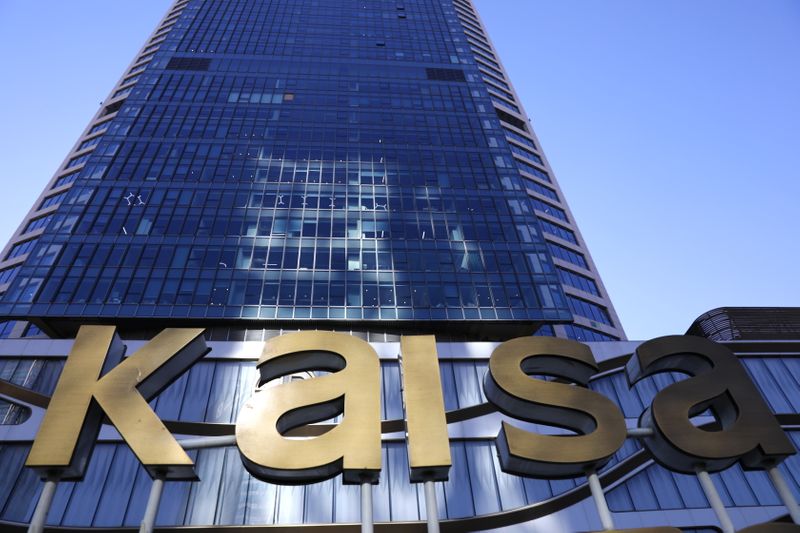By Scott Murdoch and Samuel Shen
HONG KONG (Reuters) - Chinese developer Kaisa Group Holdings Ltd is unlikely to win bondholders' approval to extend the maturity of a $400 million bond due next week, analysts say, heaping more pressure on other indebted peers.
Kaisa's proposal to delay the maturity of the bond by 18 months comes against the backdrop of growing creditor concerns about Chinese property developers' ability to meet their near-term offshore repayment obligations.
Some developers in late October called on regulators to extend their offshore bond maturities https://www.reuters.com/business/exclusive-china-developers-propose-offshore-debt-maturity-extension-2021-10-27 or undertake a debt restructuring, as a growing number of defaults hit the sector in a fallout from embattled China Evergrande Group.
Kaisa needs at least 95% of its bondholders to approve a proposal to exchange $400 million, 6.5% offshore bonds due Dec. 7 for new notes due June 6, 2023 at the same interest rate.
At least one group of Kaisa bondholders had rejected the offer, according to a letter sent this week by their financial advisor to the Kaisa board and a copy of which was seen by Reuters.
"The group believes that the terms of the exchange offer are unacceptable and illustrate an unwillingness on the part of the company to consider more appropriate and holistic ways to address Kaisa's current short term liquidity challenges," the letter said.
Kaisa, which has been trying to accelerate the disposal of real estate projects and other assets including its Hong Kong-listed property management unit to improve liquidity, did not respond to a Reuters request for comment.
The group of bondholders mentioned in the letter sent to Kaisa offered a 'forbearance period' to the company to delay the repayment to continue negotiations.
The bondholders, who say they own 50% of the debt Kaisa is trying to exchange, have offered $2 billion in fresh debt funding to the Chinese company to help it avert a default, two sources with knowledge of the offer told Reuters.
The exact details of the funding size or terms for the offer were not disclosed. The sources could not be named due to confidentiality constraints.
There had been little interaction between Kaisa and the group since the offer was presented to the Chinese developer, said the sources.
Hong Kong-listed shares of Kaisa ended nearly 1% higher on Thursday, while Evergrande rose more than 3%.
REFINANCING RISKS
Kaisa's struggle in getting a much-needed lifeline from its creditors will also weigh on other smaller developers that are looking to avoid long and messy litigation and restructuring processes, analysts said.
Developers' refinancing risks will increase if bond markets stay weak, although financially robust companies will have stronger buffers than their weaker peers, Moody's (NYSE:MCO) Investors Service said in a report on Thursday.
James Wong, portfolio manager of GaoTeng Global Asset Management Ltd, said that for Kaisa, a debt restructuring is "quite certain", as the threshold of securing approval for the bond maturity extension proposal was too high.
"Investors are waiting for that day (of restructuring) to come" he said, adding smaller Chinese developers will continue to struggle.
Kaisa, which became the first Chinese property developer to default on its dollar bonds in 2015, has said its notes exchange offer will expire at 1600 GMT on Thursday unless it extends or terminates the proposal.
Kaisa is the second largest U.S.-dollar bond issuer among China's property developers after China Evergrande Group, once China's top-selling developer and now at the centre of the country's property sector liquidity crisis.
A string of other Chinese developers are also staring at a wall of offshore debt maturing over the next few months, and some of them are scrambling to sell part of their assets to raise cash to avoid defaults.
Evergrande, which has more than $300 billion in liabilities, failed to pay coupons totalling $82.5 million due on Nov. 6 and investors are on tenterhooks to see if the developer can meet its obligations before a 30-day grace period ends on Dec 6.

Despite the unprecedented funding squeeze caused by the regulatory crackdown on debt accumulation in the sector, some developers are now able to raise fresh credit in the home market.
Three developers plan to sell bonds in China to raise a combined $2.8 billion, signalling Beijing is marginally easing liquidity strains for the sector.